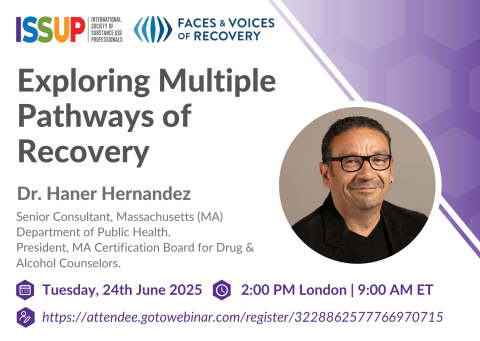Exploring Multiple Pathways of Recovery

ISSUP and Faces & Voices of Recovery bring you the Global Recovery Network Webinars, a series of eight webinars taking place over the coming months, grouped under three core themes that explore global perspectives on recovery support.
We begin with Theme 1: Core Foundations of Recovery.
Join us for Part 1: Exploring Multiple Pathways of Recovery, highlighting the principles of multiple pathways to recovery across diverse international contexts.
Date: Tuesday, 24th June 2025
Time: 2:00 PM London | 9:00 AM ET
Recovery from substance use and mental health challenges is not a one-size-fits-all journey. Around the world, people experience recovery through a range of culturally informed, community-driven, clinical, and peer-supported pathways.
This session introduces participants to the concept of multiple pathways to recovery, emphasising the value of choice, inclusion, and respect for diverse traditions and practices. Attendees will examine how recovery is defined across different cultures, the role of social and systemic supports, and the importance of empowering individuals to find their own path toward wellness. Key aspects to be covered include:
-
Welcome & Introduction
-
Understanding Recovery Across Cultures
-
Exploring Multiple Recovery Pathways
-
Barriers and Social Determinants of Recovery
-
Role of Peer and Community Support
-
Practice Integration Activity
-
Wrap-Up and Call to Action
Intended audience:
This webinar is intended for:
-
National Drug Councils and policymakers
-
Civil society organisations involved in recovery
-
Recovery champions and advocates
-
Professionals and practitioners in the field of recovery
-
People with lived experience in recovery
-
Academics and researchers specialising in recovery
Learning outcomes:
By attending this webinar, participants will be able to:
-
Describe the principles of multiple pathways to recovery across diverse international contexts.
-
Identify a wide range of recovery approaches, including traditional healing practices, mutual aid, faith- and spirituality-based recovery, harm reduction, medication-assisted recovery, and peer-led models.
-
Discuss how cultural, social, economic, and systemic factors influence recovery choices and access globally.
-
Recognise how stigma, discrimination, and human rights shape recovery experiences around the world.
-
Apply inclusive, culturally responsive, and person-centred strategies to support recovery in varied global settings.
Presenter:
Dr. Haner Hernandez
Dr. Hernández is originally from Puerto Rico, is bilingual and has worked for 31 years in the health and human service field developing, implementing, and evaluating culturally and linguistically intelligent youth and adult health prevention, intervention, treatment, and recovery support programs. Also, Dr. Hernández has many years of experience in delivering addiction counselling and clinical supervision to professionals in the field. Furthermore, he is a professional trainer and facilitator and provides individualised technical assistance and support to organisations that provide addiction prevention, intervention, treatment and recovery supports. Haner is a person in long-term recovery from addiction and is committed to eliminating health disparities by working at the national, state, and local levels. He is currently a Senior Consultant to the Massachusetts Department of Public Health, with a focus on disparities, building health equity, addiction treatment, recovery supports, and the Recovery Support Centers located throughout the Commonwealth. He also consults and teaches a number of courses at the New England Addiction Technology Transfer Center (ATTC) at Brown University and the National Latino and Hispanic Mental Health TTC.
Dr. Hernandez was appointed to SAMHSA Bringing Recovery Supports to Scale Technical Assistance Center Strategy (BRSS TACS) steering committee in 2014 and the Criminal Justice Policy Committee in 2018. He has served a consultant to several federally-funded initiatives in the areas of behavioural workforce development, HIV/AIDS, Substance Use Disorders prevention and treatment, military service members, their families and TBI and PTSD, and paediatric asthma. Dr. Hernández serves as faculty at the New England School of Addiction Studies since 1998, has taught a number of undergraduate and graduate courses, and has presented at several national and state conferences.
Dr. Hernández serves as President of the Board of Directors of the Massachusetts Board for Voluntary Certification of Drug and Alcohol Counsellors, is a member of the Board of the Massachusetts Organisation for Addiction Recovery (MOAR), was appointed to the Springfield Public Health Council in 2006, and served on the Massachusetts Governor’s Latin American Advisory Commission in Massachusetts from 2000-2004
Language:
The event will be in English with interpretation available in Spanish.
***********************************
Interpretation
Interpretation Instructions for Spanish speakers:
Access the Spanish Interpretation: https://meeting.interactio.com/link/recovery#app
Enter the meeting code: recovery
Select the language channel: Spanish
A few important details on how to listen to the interpretation:
By phone: The best way is to open the Interactio app and listen to the interpretation on your phone while watching the video meeting through your computer;
By computer: If you want to listen to the interpretation on the same device as the video meeting, you will need to select 'No Audio' in the GoToWebinar Control Panel, and only listen through the Interactio web app at meeting.interactio.com.
Webinars and online events delivered and hosted by the International Society of Substance Use Professionals (ISSUP) are provided for informational purposes only. They are educational in nature and do not constitute medical advice, diagnosis or treatment.
- ISSUP members can join Networks to comment – Sign in or become a member